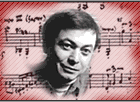IVAN TCHEREPNIN
(1943-1998)
|
|
Ivan Tcherepnin as a young boy |
Ivan Tcherepnin was born in Paris,
France on February 5, 1943. Grandson of composer-conductor
Nikolai Tcherepnin, and son of the celebrated Alexander Tcherepnin
and the noted pianist and pedagogue Ming Tcherepnin, Ivan
won international recognition as a composer, as had his grandfather
and father before him. Trained in music by his parents from
earliest childhood, Ivan immediately showed his hereditary
gifts. At age six, he devised the following theme (repeating
it all the way down the keyboard):

which his father would whimsically use as the second subject
in the finale of his Harmonica Concerto, Op. 86.
 |
Ivan Tcherepnin
Age 24 |
The following year, Alexander and
Ming accepted permanent appointments to the faculty of DePaul
University, and soon brought Ivan and his two elder brothers
Peter and Serge to Chicago. There Ming made sure that the
boy's musical progress continued despite such rapidly Americanizing
tastes as his childhood passion for baseball. Indeed, the
course of Ivan's life was already decided when he entered
Harvard University to complete a degree in music, studying
principally with Leon Kirchner. Like several other gifted
composers of his generation, young Tcherepnin developed an
expertise in electronic music media that at times reversed
the pupil-teacher relationship. When Kirchner's unfinished
opera Lily was scheduled
by the New York City Opera, Tcherepnin's guidance and assistance
in realizing the electronic and taped portions proved invaluable
in bringing the piece to the stage. (It may be noted that
his elder brother Serge had provided similar assistance to
their father in the production of an electronic radio-drama
score, and later developed the Serge synthesizer, which Ivan
frequently used in his electronic pieces.)
 |
|
Serge and Alexander Tcherepnin |
Concurrently with his work at Harvard,
Tcherepnin studied in Europe with Pierre Boulez and Karlheinz
Stockhausen. After holding teaching positions at the San Francisco
Conservatory of Music and Stanford University, Tcherepnin
joined the music faculty of Harvard University in 1972, where
he also served as Director of the Harvard Electronic Music
Studio.
That Ivan wore the mantle of Alexander
Tcherepnin lightly, studying with leading European avant-
gardists in order to find new paths, delighted his father.
Yet the latter's unfailing encouragement of experiment eventually
became something of a burden. Ivan wrote: “For many
years, even my most outrageous musical experiments were assented
to by my father. Perhaps there was some inner frustration
on my part that resulted from his forbearance and openness,
and maybe I was testing how far I needed to go to reach the
point where my music would no longer be understood or approved
of by him. That point was reached in 1976, when my father
came to a live?electronic piece I had composed for the Merce
Cunningham Dance Company in New York. When we came home after
the concert, my father seemed distraught and said something
to the effect that he couldn’t understand how I could
consider what I had done to be music. I was too exhausted
from the performance to answer, but I remember my brother
Serge coming to my rescue. The next day, the same piece was
performed and this time my father accepted it, even liked
it. But nevertheless, I had reached a crossroad. I no longer
felt the need to set artificial limits to my musical expression,
no need to cut myself off from my musical roots, no need to
cut off my nose to spite my face. No more!”
 |
|
Ivan gets electronic patches ready
for a performance
|
This challenging eighty-minute piece
(Set, Hold, Clear and Squelch
for oboe and synthesizer) later became the basis of
Tcherepnin’s seventeen-minute Le
Va et le Vient (1978), the earliest orchestral piece
in his catalogue, and one of his most important efforts. It
was prompted by his singular experience on September 29,
1977, when, within a few hours, his second son was born in
Boston and his father died in Paris. With his profoundly searching
philosophical bent, the composer saw in this coming and going
a metaphor for life itself, and its strange gifts that ineluctably
blend joy and tragedy. Prolifically exploiting a single, ultra-simple
thematic idea (the slow rise of a half-step), Tcherepnin took
two avant-garde styles of the 1970s—sound collage and
minimalism—to their furthest extremes. An enormous panoply
of orchestral color effects dramatizes these slow, short glides
upward: cluster chords, other dense harmonies, wind skirls,
horn whoops, percussion punctuations, etc.
Yet the overall effect is one of intent austerity, for the
sounds tend to the astringent, avoiding any voluptuous comfort.
Toward the center of the piece, falling semitones begin to
appear, and for a while an illusory stasis rules, with regular
up-and-down oscillation sometimes speeding up into trills.
The rising element resumes ascendancy, however, occasionally
propelled into recognizable segments of a scale as the coloristic
decoration becomes even more riotous.
 |
|
Family duet of Ivan and daughter Sarina
|
As with Stravinsky after Le
Sacre du Printemps, Tcherepnin’s work after Le
Va et le Vient took a turn no one would have predicted.
His mature style, in which post-modern elements leaven modernist
exploration, in fact reflects a spiritual quest that he shared
with many others in a generation disillusioned by the uglier
aspects of the Vietnam War, Watergate and the constant setbacks
faced by the era's great civil rights struggle. To a degree,
he immersed himself in the counterculture that informally
developed among idealistic young adults. To the counterculture's
wholesale rejection of Western art and values, however, he
was fortunately immune, thanks to a deep love for his traditional
and familial musical heritage. The result was a uniquely wide
and broad stereoptic perspective, lending his aesthetic philosophies
and practices a rare inclusiveness that ignored only artistic
untruths.
 |
|
Ivan and his sons Stefan and Sergei
entertain John Cage in their kitchen
|
In redrawing the too-often artificial
boundaries between art and reality, he found a kindred spirit
in John Cage, who became a close friend, and took a lively
interest in Tcherepnin’s music. When Cage gave Harvard’s
Norton Lectures he was Tcherepnin’s house guest, and
on their frequent mushrooming excursions together Cage shared
his exhaustive knowledge of mycological lore. Contemplation
of the Cageian mysteries of indeterminacy further widened
the scope of Ivan's art.
In Tcherepnin’s work literally
dozens of musics—traditional and revolutionary, old
and new, instrumental and electronic—co-exist and cross-pollinate.
One of his primary artistic goals was to keep the ear-mind
connection open and free of artificial constraints. He believed
this connection was the most important avenue for communication
and development available to humans. Reveling in the interaction
between performance and composition, Ivan prized his mastery
of Western technological instruments (the piano and synthesizer)
while also delighting in such traditional “low tech”
instruments as the psaltery and the Persian santur, and allowing
the worlds to interpenetrate in a manner that sometimes obliterated
the distinction between “live” and “electronic.”
This marriage of east and west, old and new informed his ambitious
Santur Opera (1977), for
santur, electronics, and projections, which was staged in
1981 by Peter Sellars at the Paris Festival d’Automne
and won the Grand Prize of the 1982 Arts Electronica Festival
in Linz (Santur Opera II: the sequel was completed in 1994).
The same principle is evident in the graceful and beguiling
Flores Musicales (1980)
which calls for oboe, psaltery and violin, all of whose sounds
are processed and transformed (sometimes imperceptibly, sometimes
radically) by a veritable armada of electronic modules.
In subsequent years, Tcherepnin frequently
conducted and lectured in Europe, Asia and the US, and held
composer residencies with Music at Marlboro, Rockefeller Center
at Bellagio (Italy), Dartington Summer Music School (England)
Santa Fe Chamber Music Festival and Korsholm Music Festival
(Finland). His numerous honors included awards from the American
Society of Composers, Authors and Publishers and the National
Endowment for the Arts. Notable among his many commissions
was a series of works for the American Wind Symphony Orchestra.
His oratorio And So It Came To
Pass (1991), commissioned in commemoration of the 100th
anniversary of the Oratorio Music Society and premiered that
year at Carnegie Hall, combined extraordinary practicality
(the chorus consisted of dedicated amateurs) with spare, Apollonic
musical poetry. Much of its unity derives from strategic recurrences
of a single intervallic leap established at the outset.
 |
|
Ivan with his wife, Sue-Ellen Hershman-Tcherepnin,
receiving the International Grawemeyer Prize
|
The best-known of Tcherepnin’s
later works is undoubtedly the Double
Concerto for Violin, Cello, and Orchestra (1995), for
which the composer won one of the most prestigious awards
offered by the music world: the University of Louisville’s
International Grawemeyer Prize. Commissioned by the Greater
Boston Youth Symphony Orchestra, this piece was written for
two of Tcherepnin’s former students—violinist
Lynn Chang and cellist Yo-Yo Ma. The ultra-mellifluous score
is an homage to everything Tcherepnin found loveable about
the Romantic Concerto genre, studded with now humorous, now
adoring quotations from great Romantic concertos (including,
of course, the Brahms Double Concerto) as well as John Coltrane,
which are woven seamlessly into a rhapsodic twenty-five minute
lyric narrative. Comparing the overall atmosphere of the concerto
to that of Tcherepnin’s late masterpiece Not
A Stir of Wind for soprano and string quartet, one
discovers an uncommon emotional range: chilly foreboding and
Angst radiate from richly peripatetic string textures and
vocal lines that seem to arise from the visceral pre-conscious.
During a three-year battle with cancer
that ended on April 11, 1998, Tcherepnin’s musical
activities remained undiminished, as did his ceaseless philosophical
curiosity. To the world he showed the same gentle humor and
graceful consideration that had long made him beloved to colleagues
and students. The legacy left us by this unforgettable musical
poet reflects—as did his persona—numinous insight,
love of the moment, wit, humor, caritas and a global vision
of music and ideas.
<top>
|





